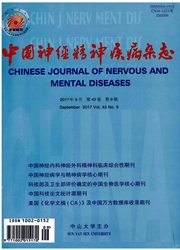

 中文摘要:
中文摘要:
目的探索ApoE基因多态性与社区健康老人综合认知训练效果的相关性。方法对89名≥70岁的社区健康老人进行12周共24次的综合认知训练,干预前后采用中国老年成套神经心理测验(NTBE)等评定认知功能,并测定其ApoE基因多态性。结果①基线:携带ApoEε-4组NTBE有2项低于不携带ApoEε4组,差异有统计学意义(P〈0.05)。②干预后:不携带ApoEε4组NTBE分测验15项提高而1项下降(P均小于0.05);携带ApoEε4组NTBE分测验6项提高而1项下降(P均小于0.05)。是否带ApoEε4.组之间NTBE各分测验差异无统计学意义(P〉0.05)。结论ApoE基因多态性与社区健康老人的认知功能及综合认知训练效果可能存在相关性。
 英文摘要:
英文摘要:
Objective To explore the relationship between the genetic polymorphism of Apolipoprotein E(ApoE) and efficacy of compositive cognitive training for community healthy elderly. Methods Using polymerase chain reaction (PCR)-based technique, polymorphism of ApoE was determined in 89 community healthy elderly aged 70 years or over re- ceived cognitive interventions in small group settings in 24 sessions over 12 weeks. All individuals were assessed by Neuro- psychological Test Battery for Elderly (NTBE) and a questionnaire "Shanghai Health Survey for the Elderly (VER2006)" in baseline and follow-up phase. Results (1)Baseline:patients with ApoE ε4 allele got much worse scores on 2 subseales of NTBE compared with elderly without ApoE ε4 allele( P 〈 0. 05 ). (2)After intervention, 15 subscales of NTBE improved and 1 subscale of NTBE declined in elderly without ApoE ε4 allele( P 〈0. 05 ) ; 6 subseales of NTBE improved and 1 subseale declined in elderly with ApoE ε4 allele( P 〈0. 05 ). There were no significant differences between elderly with ApoE ε4 allele and without ApoE ε4 allele on scores of NTBE after intervention ( P 〉 0. 05 ). Conclusions Cognitive functions and effects of cognitive training for community healthy elderly might be associated with the polymorphism of ApoE.
 同期刊论文项目
同期刊论文项目
 同项目期刊论文
同项目期刊论文
 期刊信息
期刊信息
